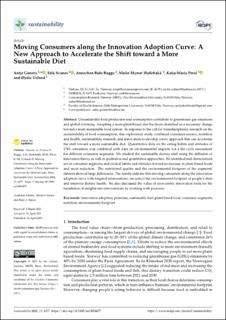| dc.contributor.author | Gonera, Antje | |
| dc.contributor.author | Svanes, Erik | |
| dc.contributor.author | Bugge, Annechen Bahr | |
| dc.contributor.author | Hatlebakk, Malin Myrseth | |
| dc.contributor.author | Prexl, Katja-Maria | |
| dc.contributor.author | Ueland, Øydis | |
| dc.coverage.spatial | Norway | en_US |
| dc.date.accessioned | 2021-06-07T10:40:16Z | |
| dc.date.available | 2021-06-07T10:40:16Z | |
| dc.date.created | 2021-04-19T12:22:18Z | |
| dc.date.issued | 2021-04-16 | |
| dc.identifier.issn | 2071-1050 | |
| dc.identifier.uri | https://hdl.handle.net/11250/2758154 | |
| dc.description.abstract | Unsustainable food production and consumption contribute to greenhouse gas emissions and global warming. Adopting a more plant-based diet has been identified as a necessary change toward a more sustainable food system. In response to the call for transdisciplinary research on the sustainability of food consumption, this exploratory study combined consumer science, nutrition and health, sustainability research, and innovation to develop a new approach that can accelerate the shift toward a more sustainable diet. Quantitative data on the eating habits and attitudes of 1785 consumers was combined with data on environmental impacts via a life cycle assessment for different consumer segments. We studied the sustainable dietary shift using the diffusion of innovation theory, as well as qualitative and quantitative approaches. We identified and characterized seven consumer segments and related habits and attitudes toward an increase in plant-based foods and meat reduction. The nutritional quality and the environmental footprint of the segments’ dinners showed large differences. The results indicate that moving consumers along the innovation adoption curve with targeted interventions can reduce the environmental footprint of people’s diets and improve dietary health. We also discussed the value of user-centric innovation tools for the translation of insights into interventions by working with personas. | en_US |
| dc.description.sponsorship | This research was funded by the Norwegian Research Council through the project Food ProFuture (267858), and by the Norwegian Fund for Research Fees for Agricultural Products (FFL) through the projects InnoFood (262303), FoodSMaCK (262308), and FoodForFuture (314318). | en_US |
| dc.language.iso | eng | en_US |
| dc.publisher | MDPI | en_US |
| dc.relation.ispartofseries | Sustainability;Volume 13 / Issue 8 | |
| dc.rights | Navngivelse 4.0 Internasjonal | * |
| dc.rights.uri | http://creativecommons.org/licenses/by/4.0/deed.no | * |
| dc.subject | Consumer segments | en_US |
| dc.subject | Personas | en_US |
| dc.subject | Plant-based food | en_US |
| dc.subject | Innovation adoptions | en_US |
| dc.subject | Sustainable diets | en_US |
| dc.subject | Nutrition | en_US |
| dc.subject | Environmental footprints | en_US |
| dc.title | Moving Consumers along the Innovation Adoption Curve: A New Approach to Accelerate the Shift toward a More Sustainable Diet | en_US |
| dc.type | Peer reviewed | en_US |
| dc.type | Journal article | en_US |
| dc.description.version | publishedVersion | en_US |
| dc.rights.holder | © 2021 by the authors. | en_US |
| dc.source.articlenumber | 4477 | en_US |
| cristin.ispublished | true | |
| cristin.fulltext | original | |
| cristin.qualitycode | 1 | |
| dc.identifier.doi | https://doi.org/10.3390/su13084477 | |
| dc.identifier.cristin | 1905061 | |
| dc.source.journal | Sustainability | en_US |
| dc.source.volume | 13 | en_US |
| dc.source.issue | 8 | en_US |
| dc.source.pagenumber | 21 | en_US |
| dc.relation.project | Nofima AS: 201703 | en_US |
| dc.relation.project | Nofima AS: 201702 | en_US |
| dc.relation.project | Nofima AS: 202103 | en_US |
| dc.relation.project | Nofima AS: 11946 | en_US |
| dc.relation.project | Norges forskningsråd: 262303 | en_US |
| dc.relation.project | Norges forskningsråd: 314318 | en_US |
| dc.relation.project | Norges forskningsråd: 262308 | en_US |
| dc.relation.project | Norges forskningsråd: 267858 | en_US |

